Peruvian PM Gustavo Adrianzén announces resignation alongside cabinet changes
Gustavo Adrianzén has resigned as Peru's Prime Minister amid criticism over his leadership and the controversial denial of the kidnapping and murder of 13 miners in Pataz.

Gustavo Adrianzén left the role of President of the Council of Ministers (PCM) on May 13, and confirmed on a press conference where he faced strong criticisms for the supposed increase in crime, also just hours after his cabinet was renewed.
“President, thinking of the higher interests of the nation, I am compelled to present my irrevocable resignation as President of the Council of Ministers,” he said during the broadcast from the Government Palace in Lima.
Gustavo Adrianzén resigns as Prime Minister of Peru
Adrianzén's resignation marked a turning point for Dina Boluarte's cabinet. Although his resignation happened after many questions about his approach to public safety, it was his refusal to accept that 13 miners were kidnapped and later killed in Pataz that really lost him the cabinet.
Still, in his farewell speech, Adrianzén only talked about what he viewed as “the achievements of his time in office,” thanking the ministers and officials who accompanied him along the way. “Sooner or later it will know that we did everything for Peru, and we did it heartily,” he said at the end of the conference.
Along with thanking the president, Dina Boluarte, noting that his service purpose had not diminished, and expressing his willingness to respond to any future call from the Executive, Adrianzén made a last appeal for history's judgment. “The big effort we made to dare to govern the country during the hardest moments will be noted,” he said.
The imminent departure of Gustavo Adrianzén
The announcement earlier the Gustavo Adrianzén's imminent exit was confirmed when Fuerza Popular announced it would support the motion to censure Adrianzén, which was set to be debated on May 14. Renovación Popular stated in its release that it wanted to see not only Adrianzén out, but the entire cabinet reconstituted.
Acción Popular issued a release condemning the three most recent changes in the Executive and warned that Adrianzén’s leadership of the executive “without leading” would merely worsen the existing political crisis.
APP did not state whether they supported Adrianzén’s exit, and merely rejected the allegations that they had negotiated with the Executive the position at the Ministry of Transport and Communications.
On the other hand, Héctor Valer, from Somos Perú, confirmed to La República that his bench would vote against the motion to censure Adrianzén if it were debated on May 14 in Congress. This parliamentary group plus APP would have had onle 21 votes in opposition to the resignation of the head of the cabinet. With the support of the Fujimorist and Perú Libre benches, it appeared that Adrianzén was doomed.












